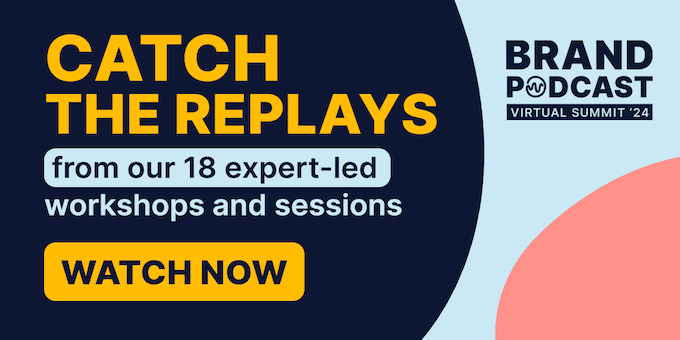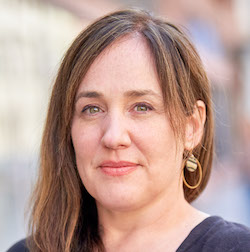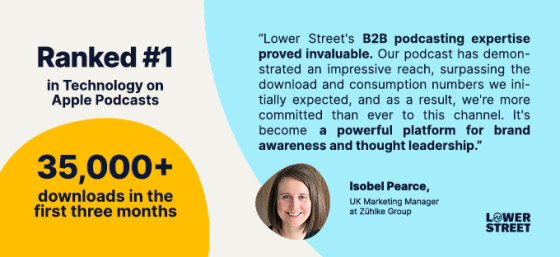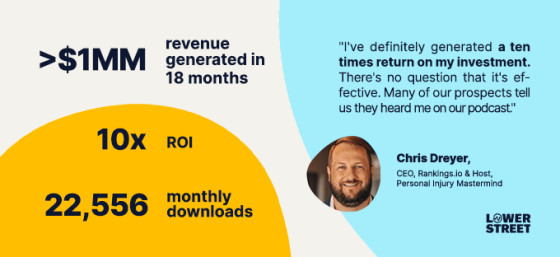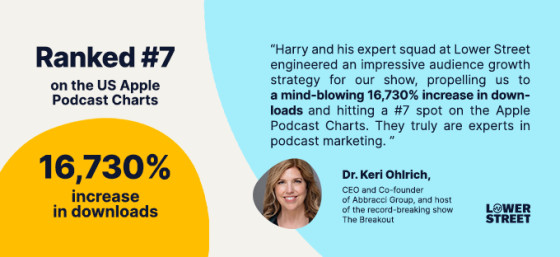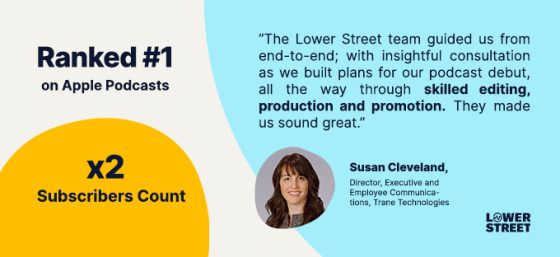Podcast Formats: Why Narrative Shows Work Best for Branded Podcasts
Contents
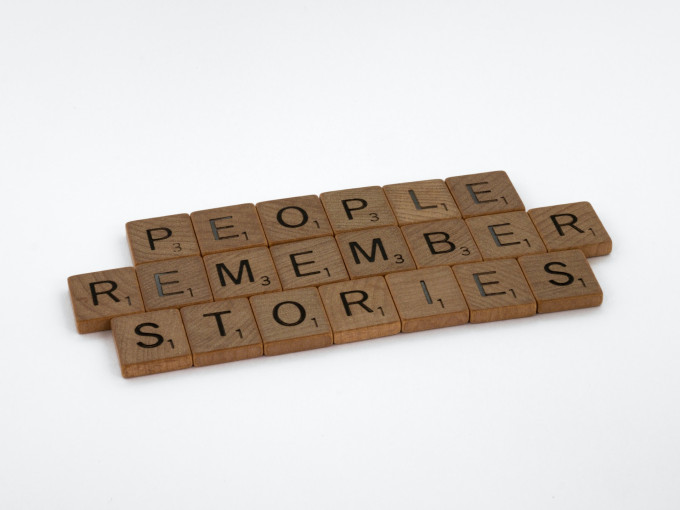
With so many types of podcasts to choose from, deciding on the right podcast format can feel overwhelming. This is probably why most companies turn to the old standby: the Interview. What they may not know is that for branded podcasts, the real winner is storytelling. Find out why narrative shows work best for businesses.
As anyone who’s ever launched a podcast knows, the leap between launch and organic growth is a big one. You believe in your show: you’ve got a cool idea, great guests, good writing, and a quality host.
All the key elements are in place, and you just know that it’s going to take off and find its audience. But the truth is, it’s crowded out there, and organic growth is difficult to achieve without the right expertise.
This is why most businesses engage the services of an agency like Lower Street to help them navigate the complex landscape of podcast production and promotion and find the most effective format for their show.
The ability of narrative podcasts to engage, captivate, and leave a lasting impression makes them a powerful tool for building brand loyalty and achieving business goals.
In this article, we'll explore why narrative shows are the best format for branded podcasts. Drawing on some fascinating data from Signal Hill Insights, we'll unpack the psychology behind listeners' preference for stories and how it can be harnessed to elevate your brand's storytelling journey.
Next, we’ll provide three key tips to help you create a compelling narrative podcast that resonates with your audience. Lastly, we’ll take you on a whistle-stop tour through some of the other more common podcast formats.
Getting Sucked In: The Science of Storytelling
A funny thing happens when you tell someone a story. Their face relaxes, their breathing deepens, and they stare into the distance. Anyone who’s ever been in a room full of kids listening to a story knows the room is immediately hushed, mouths are agape, and eyes are transfixed.
It’s weirdly magical. Researchers call it the story-listening trance, and it’s just one way that stories help us slow down enough to connect with and retain information.
For millennia, humans have used stories to pull important knowledge together into one easy-to-understand, easy-to-remember package. We’re hard-wired to love them—a good story nestles in your brain and makes you want to pass it along. And that’s where Signal Hill’s data really shines (more on that in the next section).
The benefits of storytelling for brands go beyond mere promotion. At its heart, storytelling allows brands to form deep, meaningful connections with customers by taking them on a journey; as they listen, they have an experience with the brand that plugs into their emotions and memories. The value of that is hard to overstate.
Stories are also inherently more shareable. Narrative shows can significantly boost brand awareness. When a brand story sparks interest and engagement, it compels listeners to share it with others, creating a ripple effect that extends its reach.
In essence, brands that effectively leverage the power of narrative storytelling in their podcasts can tap into a deep-rooted human instinct to share and connect, cultivating a solid and engaged community around their brand.
The Power of Narrative Podcasts
Before we dive into the benefits of narrative podcasts, let's first clarify what we mean by the term. In this context, a narrative podcast is an audio documentary that follows a captivating story arc.
Unlike traditional linear storytelling, narrative podcasts have the flexibility to be non-linear. They can incorporate various techniques to draw the listener in, such as clips, sound effects, scripted segments, and music. With this mix of immersive detail, narrative shows are more likely to receive higher ratings from listeners.
Signal Hill’s recent research found that audiences were 14 percentage points more likely to “listen again” and 11 percentage points more likely to “recommend” a narrative show vs. an interview show. The research also revealed that brand favorability was 10 percentage points higher for narrative shows. In an industry that lives and dies by recommendations and returns audiences, these numbers are nothing to sniff at.
With any branded show, the goal is to build strong followings and create the conditions for organic growth, and Signal Hill’s data suggests narrative shows do that better. There are a couple of reasons why they tend to receive higher ratings.
First, they are more likely to create a personal and emotional connection with listeners. When we listen to a story, we put ourselves in the character's shoes and experience their emotions alongside them. This can create a strong bond between the listener and the show.
Second, narrative shows are more likely to tell compelling and memorable stories. They have a natural story arc (clear beginning, middle, and end) and often use suspense and drama to keep listeners engaged. This can make listeners more likely to come back for more and share the show with others.
Brand recall is also the same for both formats (narrative and interview), so you’re not sacrificing recall by going the narrative route. However, narrative shows have a lighter brand touch, and that's where there’s gain with listener engagement. By making the show more enjoyable, listeners are more likely to listen again.
Three Tips to Create an Effective Narrative Podcast
There’s a perception that narrative podcasts are way more of a heavy lift. And yes, making a good one is work, but the boost brands can get from it is worth it. So much can be done with strong writing and great sound to get listeners into that trance and keep them coming back for more.
We’ve written an in-depth guide on how to plot a narrative series, so make sure you head over there and read that next. For the purposes of this post, we’ll focus on three practical tips that can help elevate your narrative podcast.
1. Develop a Strong Story Concept
It all starts with a compelling story concept. This could be an overall theme that drives your series or a unique premise that sets your podcast apart.
Consider your target audience's interests and what kind of story would engage them. Combining a unique idea with an understanding of your listeners can help you create something truly captivating.
2. Choose the Right Host
Your host is the voice of your podcast, and their narration skills and rapport with the audience will significantly influence its success. Look for someone who can deliver your story with enthusiasm and authenticity, making your listeners feel like they’re part of the journey.
3. Craft Compelling Episodes
Creating compelling episodes is crucial to driving your overall story. Here's what that looks like:
Consistent Structure: A properly structured podcast allows listeners to follow along easily. Each podcast episode should have a clear introduction, body, and conclusion.
Engaging Content: Attention-grabbing content hooks listeners. Use cliffhangers at the end of each episode to keep your audience eagerly awaiting the next installment.
Narrative Flow: Ensure smooth transitions between themes and subjects within the episode for easy listening.
Powerful Opening and Closing Lines: Intros and outros leave a lasting impression and reinforce your show's overall narrative.
With well-written scripts and a strong host, you can create an immersive narrative experience that continues to attract and engage your audience, episode after episode.
Case Study: Climate Vision 2050
If we could see the world in 2050, would we do more today to tackle climate change? That’s the question Rich Lesser and his colleagues at Boston Consulting Group (BCG) ask in their podcast Climate Vision 2050, produced by Lower Street.
Each episode focuses on a different aspect of life in 2050, such as transportation, food production, and urban development. Employing an engaging narrative style, the show transports listeners into a future that’s both exciting and sobering and offers practical insights into what we can do now to forge a greener path.
With immersive soundscapes accompanying the character’s narratives, listeners are placed directly into their reality. BCG uses compelling guests —scientists, politicians, and thought leaders— to add depth and credibility to their narrative. The audience not only gets to learn from these experts but also hears firsthand accounts of the potential effects of climate change, enhancing the show's overall impact.
Using these critical storytelling elements, the podcast does a great job of setting up engaging discussions on complex topics to help listeners understand and connect with these issues on a deeper level.
The success of Climate Vision 2050 can be attributed to many of the principles discussed earlier. It’s also evident in the reviews listeners have left.
“This podcast gives me goosebumps and tons of desperately needed hope!”
“The episodes push the knowledge base on climate and sustainability forward—can’t wait to recommend this show to friends.”
“I always look forward to the next episode.”
“It really is an immersive vision of what the near future may manifest as.”
“What a story!”
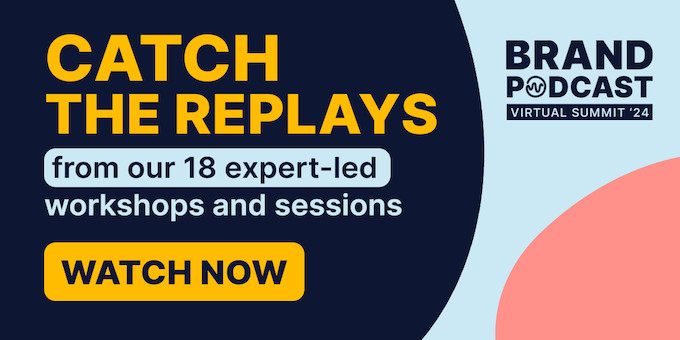
Seven Popular Podcast Formats
Now that we’ve highlighted the (many) advantages of narrative podcasts, let's look at some of the other commonly used podcast formats for a better understanding of why narrative shows have become an intriguing option for branded podcasts.
1. Interview Format
One of the most popular types of podcast format, interview podcasts are often set up as one-on-one interviews between the podcast host and a guest. The success of these shows largely depends on the host's ability to ask intriguing questions and the guest's ability to provide interesting answers.
Example: The Road to Why by The Northern Trust Institute
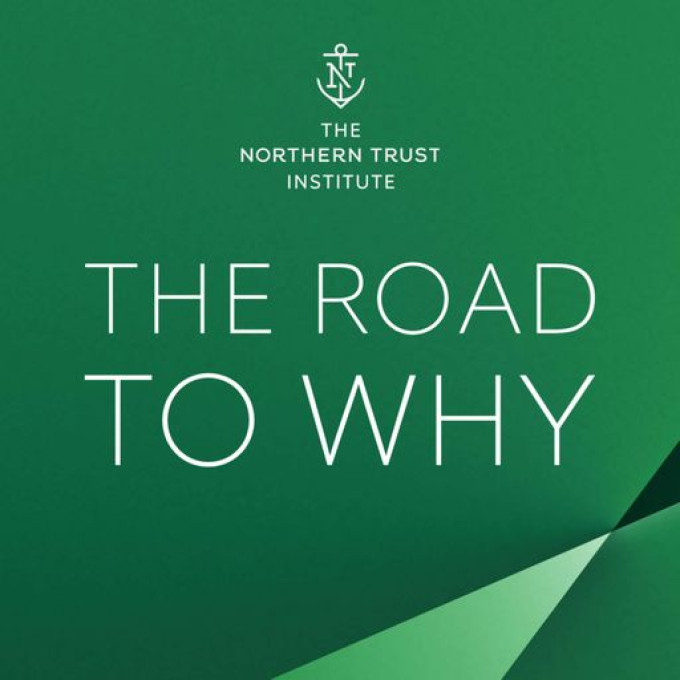
The Road to Why is a Lower Street production. Like how it sounds? Get in touch to find out how we can help launch your branded podcast.
2. Mini Podcast
This format is short (1-20 minutes max), making it ideal for hosts who have an abundance of information on any given topic but not much time to share it. These bite-sized episodes are often filled with facts, tips, and insights, allowing listeners to learn quickly.
Example: TEDx Shorts
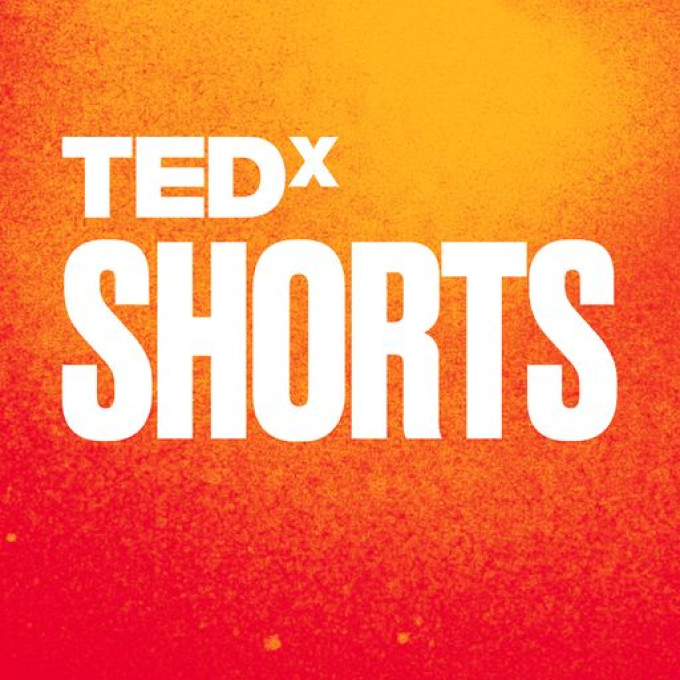
3. Panel Podcast Format
A panel podcast features a group of people having a discussion about a particular idea or issue. The panel can consist of recurring guests or a new set of people for each episode.
Example: Slate Political Gabfest
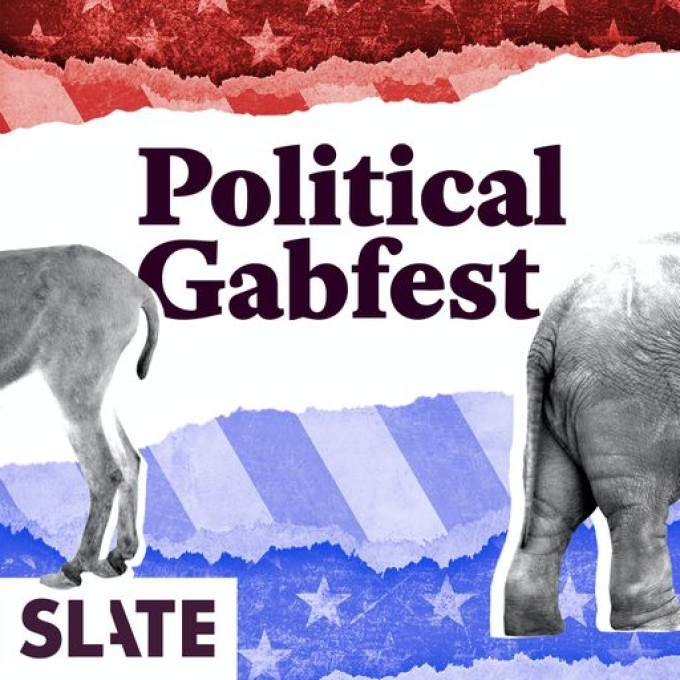
4. Co-Hosted Podcast
Co-hosted podcasts feature two or more hosts discussing a particular subject. This format often results in engaging and lively conversations, creating a more immersive experience for the listeners.
Example: Happier with Gretchen Rubin
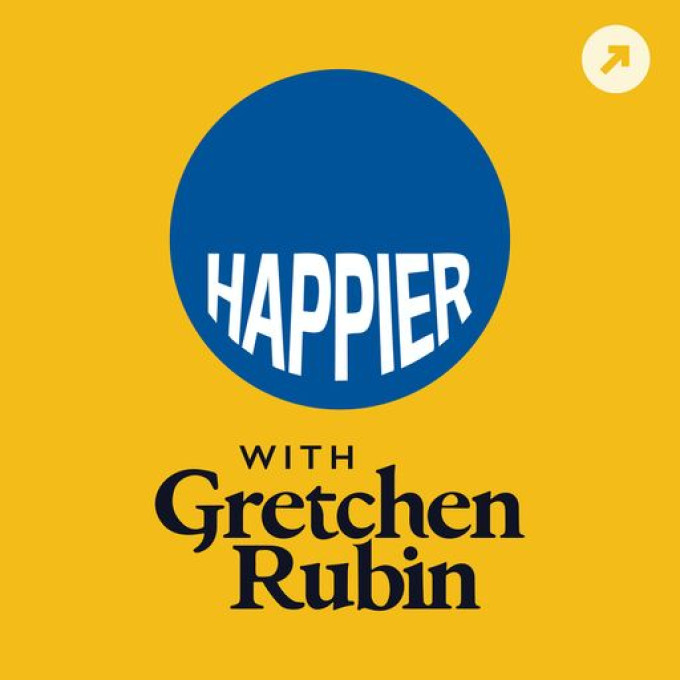
5. Educational Show
These shows aim to educate podcast listeners about a specific theme or subject matter. It can range from history, science, and business to self-help and more. The podcast hosts are typically experts in the field.
Example: Stuff You Should Know
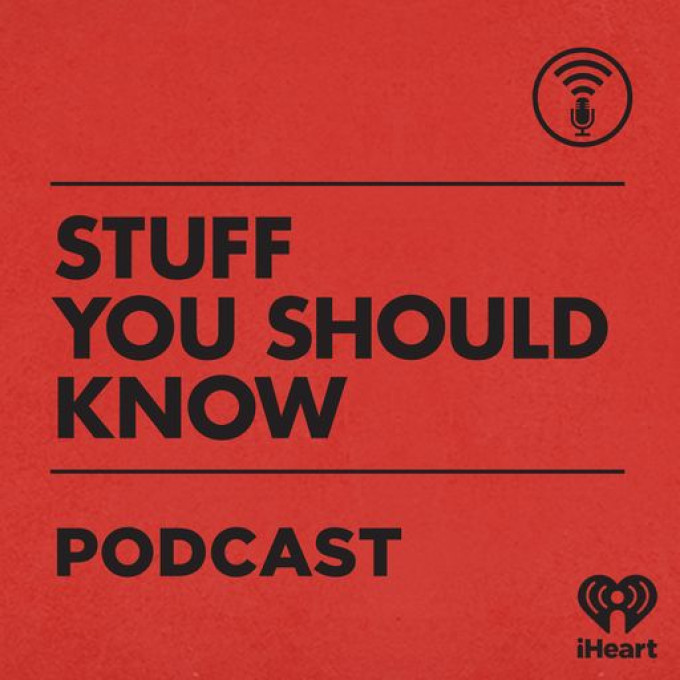
6. Solo Podcast Format
With solo podcasts, a single host shares their insights, thoughts, or information about a range of things. It requires strong subject knowledge and the ability to engage with the audience without any guests.
Example: Short Wave from NPR
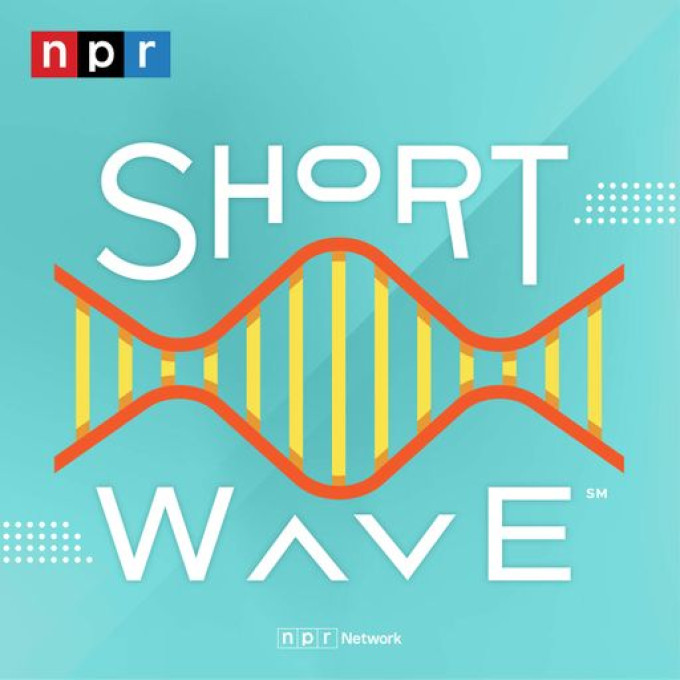
7. Fiction Podcast
Although they sometimes fall under the narrative umbrella, fiction podcasts are a format on their own. They’re essentially audio dramas that tell stories through dialogue, sound effects, and captivating narratives. These long-form shows immerse listeners in make-believe worlds, leaving them eagerly awaiting the next episode.
Example: Climate Vision 2050 by BCG, in collaboration with Lower Street
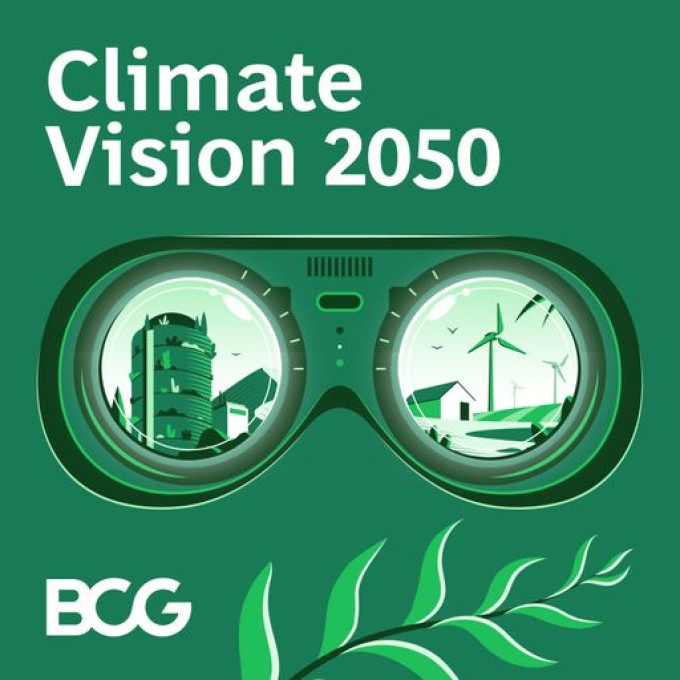
Each of these different podcast formats has its unique benefits and potential drawbacks. However, when it comes to branded podcasts, the power of narrative gives the format an incredible edge.
Signing Off: Why Narrative Reigns Supreme
In the world of branded podcasts, narrative shows are streets ahead of other podcast formats. Their unique ability to engage, captivate, and leave a lasting impression, combined with higher listener ratings and the potential for organic growth, make them a compelling choice for businesses.
With the emotional connection and strong listener engagement that the format provides, you could create a show that not only resonates deeply with your audience but effectively communicates your brand's values and vision simultaneously.
Intimidated by what you think might be a heavy lift? Don’t be. Our narrative podcast service will guide you through the process—from developing a strong story concept and choosing the right host to crafting compelling episodes. Your audience awaits! Get in touch today to learn more.
